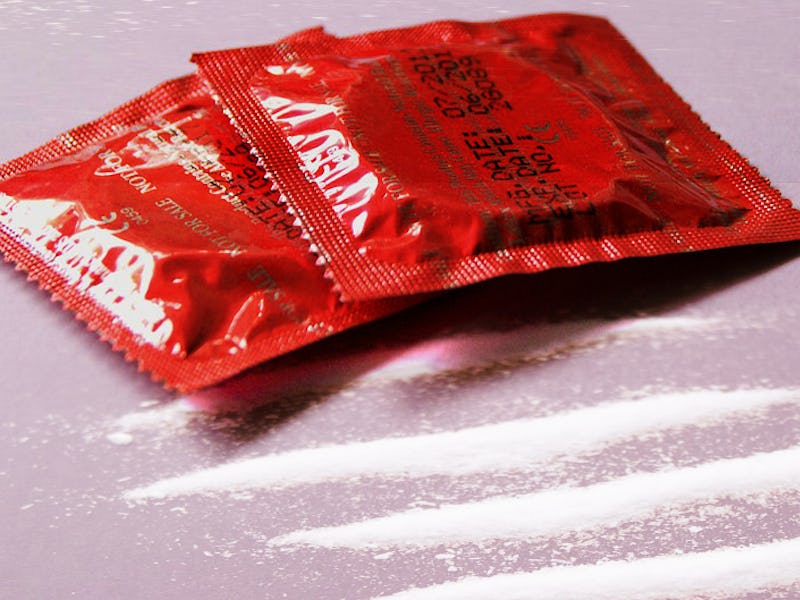
In one unforgettable scene in Wolf of Wall Street, Leonardo DiCaprio snorts cocaine out of a prostitute’s butt. It is a neat summation of a phenomenon that drug users have long observed: Cocaine makes people incredibly horny. So horny, in fact, that scientists are worried about its effect on decision making, especially when it comes to safe sex. A new study confirms those concerns: Cocaine can make users too sexually impatient to put on condoms.
In the past, studies have shown that regular cocaine users were at a higher risk for catching STIs, including HIV, but it’s only now become clear why that correlation exists. The study, recently published by researchers from Johns Hopkins University in the journal Psychopharmacology, suggested that “sexual impatience” is the most likely explanation for that increased risk. Using cocaine, in other words, makes people so horny that putting on a condom is an afterthought rather than a requirement.
If so, he is also less likely to die wearing a condom.
The study was a small one, but it was thorough: Twelve participants of varied race and gender and an average age of 27 were given a pill of cocaine that was enough to produce its characteristic effects: euphoria, high energy, and hyperalertness. In the first task, every ten minutes over the next 4.5 hours, participants rated their sexual desire on a 100-point scale, allowing the researchers to see whether the amount of cocaine in the body and sexual desire were correlated. Their hunch was right: The drug’s effect and sexual desire both peaked around 45 minutes after the drug was taken. Larger doses corresponded with greater effects and increased sexual desire.
In a second task, the participants were presented with photos of potential sexual partners and a hypothetical description of what sex would be like with the person they deemed least likely to have an STI. They were then asked to rate how willingly they would use a condom if one were made available to them immediately. Then: What if you had to wait two minutes before getting one? Five minutes? The same question was asked regarding periods of 15 minutes, 30 minutes, one hour, three hours, and six hours.
A third task asked similar questions, but there was a caveat: The person participants were having hypothetical sex with might give them an STI. The researchers assessed the participants’ willingness to use condoms if the chance of getting infected was 100 percent (one in one), one in three, one in 13, one in 100, one in 400, one in 700, one in 2,000 or one in 10,000.
The results of these questionnaires revealed some troubling insights into the sex habits of cocaine users. While both cocaine-dosed participants and their sober control counterparts were equally as likely to use condoms if they were immediately available, participants on cocaine were more willing to have unprotected if they had to wait for long periods of time. People high on cocaine were only about 40 percent likely to use a condom if they were forced to wait an hour, while sober participants were 60 percent likely. And when there was a one in 2,000 chance of contracting an STI, those who received the highest dose of cocaine were only about 40 percent likely to use a condom, while their sober counterparts were 70 percent likely to do the same.
Cocaine, unsurprisingly, increases the urgency that users feel when they want to have sex — to the point that they are willing to put themselves at risk of infection. Sexual decisions, of course, are not the only ones that are compromised by cocaine: A recent study showed that long-term cocaine use turns users into really ballsy gamblers when it comes to money, as well.